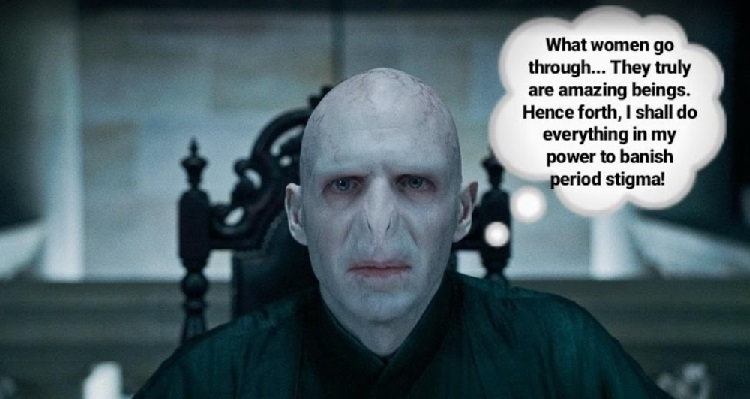Why We’re Still Shouting About Periods
Recently I decided to write a blog post about periods, in which I shared my personal experience with period shame and sanitary products, especially the menstrual cup. Twelve year old me would be super embarrassed to know that my first period story is now public. I still am sometimes.
We all remember Chandler’s face when he ended up at the play ‘Why Don’t You Like Me?’ and the star of the one woman show stood up tall and exclaimed ‘Chapter One, My First Period.’ His expression wasn’t very encouraging.
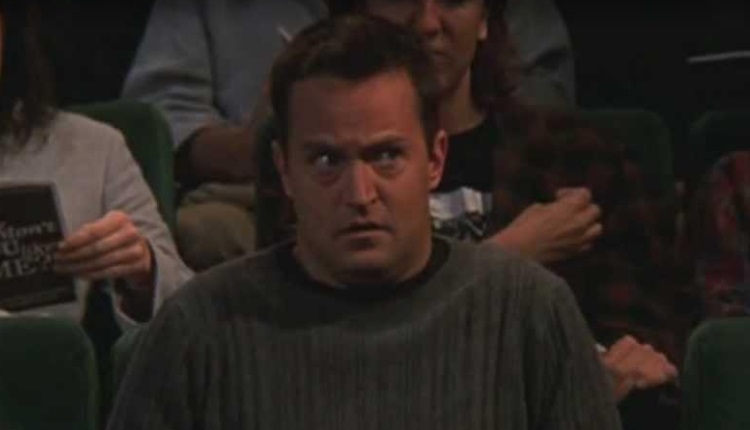
But period shame is much bigger than my and Chandler’s unease. Just because it’s awkward and embarrassing doesn’t mean we can gloss over the matter. And the only way to shed this stigma is by talking about it. Children need to know what is happening to them when they get their first period. No child should ever find blood in their underwear and think that they’re dying because no one spoke to them about menstruation.
Writing about periods has opened up a lot of conversations for me online and off, male and female. One of the most common stories I heard from people is that they hid their first periods, even from their mothers. In one case, someone made do with tissue for up to a year. One friend told me that she hid it because she was so terrified of entering womanhood. Most couldn’t say why they did this.
In an online poll, I asked women if they had ever spoken with their fathers about periods. Of the 37 respondents, 81% said they had not.
It is important to note that these are women in their 20s today. We’re not talking about 1960’s Ireland. Still this isn’t any wonder. Reactions like Chandler’s were the only representations we had in popular culture while growing up. We never saw Rachel ask Monica for a tampon (Condoms? Sure. Sanitary products? Gross) We never saw Sabrina the Teenage Witch come home to her aunts with an embarrassing story about the leak she had at school.
Think of the revenge spells she could have cast on anyone who shamed her. “Well, how do you like blood leaking beyond your control Libby!?”

Normalising the normal
Assuming Voldemort isn’t reading this, it’s safe to say that we all want to be kind and loving beings. Periods can be painful both physically and mentally. They can be exhausting. They can be expensive and they can be a downright nuisance.
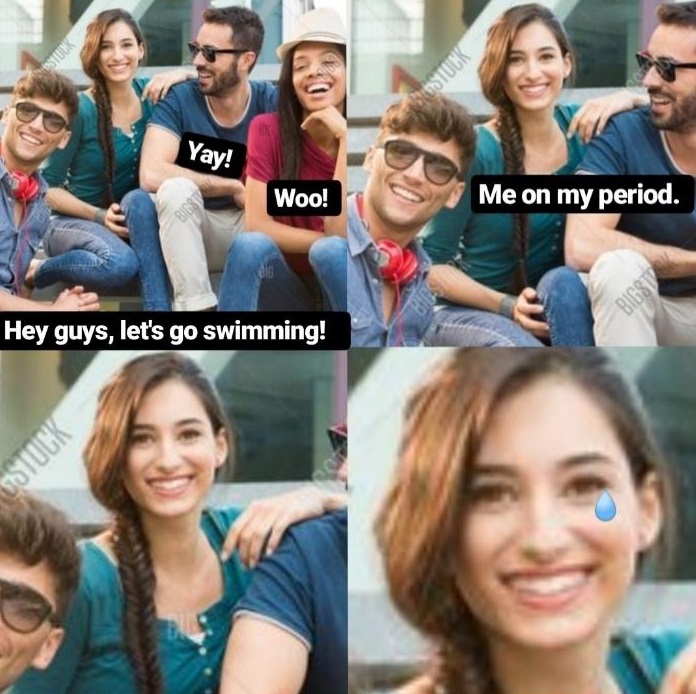
We should be able to ask our friends and family, male or female, to pick us up some pads or tampons if we’re in need. We should be able to vocalise our suffering and receive sympathy for it. Normalising this as a topic of conversation is a vital, because it is perfectly normal.
In fact, today some medical practitioners view menstruation as the sixth vital sign. When something is up with our periods, it can signal other health problems. Whether they are lighter or heavier than usual, more sporadic or more frequent, they tell us so much about a menstruator’s overall health. Period blood is the only blood not born from violence or illness. Yet in the media we see blood spawned from violence constantly, while menstrual blood is rare. That has a damaging effect suggesting that periods are something to be hidden or ashamed of.
Since writing my last post I have noticed some changes in myself. For example, I don’t wait for men to leave the room before I bring up something period-related. I’m sure many of you have been doing this for years, but this is a big deal for me. While my instinct is still to stay quiet, I realise now how ridiculous that is; considering somewhere online there is a description of me squatting in a bathroom, pulling a bloody menstrual cup out of my vagina.
Period Poverty
Open conversations bring knowledge and power. Menstruators deserve to know all of their options when it comes to sanitary products, dealing with pain or even stopping their periods. Personally I would recommend the menstrual cup. As my blogging might demonstrate, I am more than happy to go into bloody detail on the ins and outs of the menstrual cup.
It is important to remember that there are menstruators in Ireland right now, including children, that do not have access to sanitary products, whether due to homelessness or poverty. If we can’t speak about menstruation openly then how can we address this problem? Homeless Period Ireland accept donations of sanitary products for those in need. If you can drop in some pads or tampons, I would recommend checking below for your closest drop-off point.
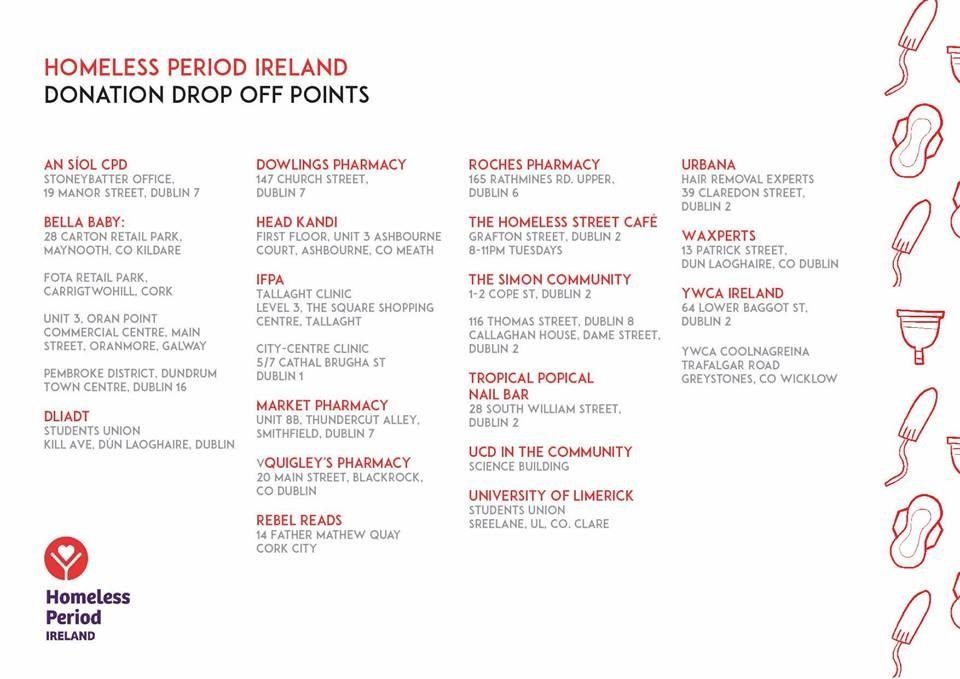
Charlotte Amrouche and the MÍOSTA Project
Breaking down this stigma requires a great deal of learning and understanding. None of this is to suggest it is a tedious task. I am grateful for all of the open conversations that I have since had. It has given me the pleasure of getting to meet people such as Charlotte Amrouche.
Charlotte is the founder of the MÍOSTA Project, which brings period education workshops to Universities around Ireland. A friend and I attended one at UCD a few weeks ago. Although they’re at universities anyone can go and they’re free. My friend and I are not students at UCD and we were waiting for the ‘She doesn’t even go here!’ but it never happened.
There was about twelve of us at the workshop. Almost straight away Charlotte gave us paper and colouring pencils. She then asked us to write or draw our period stories. This was for our own personal use, and we were free to share as little or as much of our story as we liked. As it turned out, everyone was very eager to tell their story. There were many parallels in our experiences from shame and frustration to humour and strength. And there was the feeling that we could have gone on for hours.
Fascinated, I wanted to learn more from Charlotte, and so, I caught up with her to find out more.
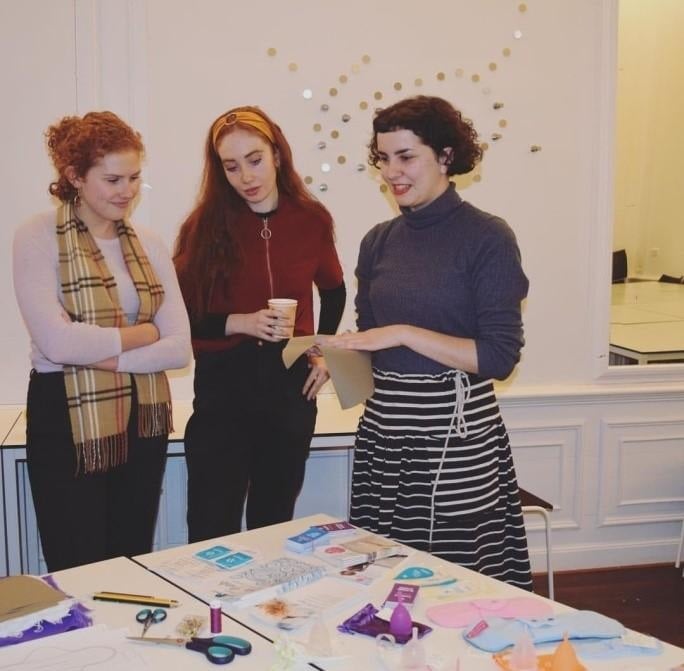
Can you tell us a bit about MÍOSTA and why you started it?
I grew up in West Cork and during my education I never received any sexual health education or any education about periods. I went to secondary school in the 00’s.
A couple of years ago I was doing an internship at a women’s organisation when a colleague asked me what I used for my period, I responded pads and tampons, and she went on to tell me about the Moon Cup. This started an exciting journey for me into reusable menstrual products and periods in general. I started researching menstrual activism in my BA and continued to explore the topic during my MA in Gender Studies in the Netherlands. While doing my MA I held a small workshop on reusable menstrual products and I fell in love with the conversations that came out of a table full of reusable products. I went on to hold a larger event for Menstrual Hygiene Day 2017 in Utrecht and it was amazing.
I came back to Ireland in 2017 to start my PhD and knew that I wanted to carry on having these conversations about periods. I launched MÍOSTA to continue these conversations. The project aims to bring interactive and engaging menstrual education workshops to people around the country. The workshops focus on reusable and alternative menstrual products, smashing menstrual shame and stigma, exploring contemporary issues to do with menstruation and creating activist interventions. In this first year I am bringing the workshops to universities around the country. However, we need menstrual education earlier than in our late teens and early 20’s. I hope to bring MÍOSTA to schools and communities in the future. And importantly MÍOSTA aims to create an inclusive space for menstruators of all genders, or people who don’t menstruate, to attend.
When were you able to start talking openly about periods?
It was that first conversation with my colleague who asked me what I used which started me talking openly about my period. I was 25 then. Writing about periods in my university assignments gave me the courage to really start talking about them, and it was during my MA when I began to introduce myself as ‘Charlotte who’s obsessed with periods.’
Do you still have ‘period shame’?
Yes! I still worry about getting my period out of nowhere and leaking in public. I go to the bathroom a lot more in the days before my period to check it hasn’t started…
Last month I was in Cork holding a workshop and getting the taxi to the bus station. I had a moment where I dreaded the taxi man asking what I was doing for the day in Cork, because I just didn’t want to explain that I was holding a workshop about periods. I think choosing when and if we want to have these conversations is an important part of the process of working through period shame.
Period shame is so ingrained and we are completely surrounded by it in our societies. To overcome period shame for ourselves we need to be able to talk about periods when we need/want to and to feel comfortable doing so. Menstrual activists who free bleed to protest the tampon tax are forever inspiring, but by no means does everyone who has a period need to do that to overcome menstrual shame.
Why is it so important to lift this stigma?
We need to lift the stigma around periods for so many reasons. It has such a wide impact on women and menstruators’ health, wellbeing and quality of life. Stigma and shame around menstruation can mean that menstruators don’t access medical care when they need it. It can mean that menstrual pain is hidden in work spaces. It means that only now are alternative products to tampons (which were invented by men) becoming mainstream. It means that when young menstruators can’t afford products they use socks or toilet paper instead of menstrual products and often stay home from school for fear of leaking.
Why do you think there is such stigma around periods?
I think it has to do with the stigma about women’s bodies. It seems to me that so many parts of women’s embodied experiences in the world are stigmatised and silenced, from periods to menopause, to miscarriage and post-childbirth. I see overcoming menstrual shame and silence as a great beginning to overcoming many of the stigma’s that continue to surround women’s bodies. If women and menstruators can remove some of the shame and stigma around their menstruating bodies they are equipped to become advocates for their menstruating, reproductive and one day menopausal bodies.
What can men do to help end this stigma?
Men can do a lot on many different levels. A recent study by Plan International Ireland found 30% of young girls were asked not to speak to their male friends, brothers and fathers about their periods. Men need to be open to talking about periods in their relationships with menstruators, either as fathers, brothers, partners, friends, co-workers or bosses. For menstrual stigma to end everyone needs to be involved in creating this change.
How do you think period education needs to change?
We need period education much earlier. Menstruators should learn about periods before they get their period.
We also need period education which includes boys and men. One of the things I often hear when holding conversations about periods is that women and menstruators would have liked boys to be present when they had period education.
Period education must include alternatives to pads and tampons, such as menstrual cups, reusable pads and period underwear. Too often pads and tampons are presented as the only options. 90% of most pads are made of plastic and just under half of tampons and pads have been found to have toxins such as glyphosate, rayon and bleaching agents. And the vagina is one of the most absorbent parts of the body. There is not one menstrual product that is right for everyone and people need to know about every option that is available so they can make informed decisions for their bodies and menstrual cycles. I don’t think we need to convert all menstruators to menstrual cups, but instead to make sure that those who don’t choose menstrual cups know all the options which are available and have access to products that are safe for their bodies.
While sex education in schools often covers the biological aspects of periods, period education also needs to teach people about how they can track their menstrual cycle and learn from it. Tracking and understanding your cycle can bring so many positive benefits, from simply understanding your own health, increasing awareness around fertility and being able to track hormonal, emotional and bodily symptoms that change with the cycle.
And finally, doing these workshops has shown me that we need more spaces where women and menstruators’ questions and concerns can be discussed and knowledge can be shared. Period education needs to be more than just learning from a facilitator or teacher, but also about learning from each other.
What have you learned from doing the workshops yourself?
Every time I hold a workshop I learn something different. I learn about the obstacles that women and menstruators face when having their period. Whether these are health concerns, stigmas within their families and communities, or queries about menstrual products. As I do these workshops I am learning that the MÍOSTA project is one jigsaw puzzle piece in the change we have to create in Ireland.
These workshops create space for conversation, to break the silence around periods, and to empower women and menstruators to take control of their period. These are important building blocks to creating societies which menstruators can be comfortable in, but we also need free/affordable products, policies which insure menstruators aren’t discriminated against in the workplace, guidelines for parents and teachers to unpack menstrual shame, and a healthcare system that supports menstruators in all their needs.
Do marginalised women like homeless women and women in direct provision need better period education alongside free sanitary products?
As I have not worked with homeless women or women in direct provision I wouldn’t want to make recommendations for them. But the fact that Homeless Period Ireland is always looking for donations shows just how needed free menstrual products are in these communities. In addition to all the tremendous difficulties these women have in accessing and affording menstrual products I can imagine they experience the same issues women in my workshops experience.
However, I wouldn’t want this conversation about periods to distract from the fact that homeless women need homes and women in direct provision need to not be stuck in the inhumane direct provision system. We pretty much all need better period education. But we also need to create an Irish society where people are not living in such terrible conditions.
Can you tell us a bit about your favourite menstrual products?
Of course. I use an organicup and period pants. I love the organicup cause it is quite a soft silicone and suits me really well. This is my second cup I have used. The first was harder and not as comfortable. Using menstrual cups can sometimes mean trying a few out. And I love to use period pants at night or on lighter days (also on lazier days).
For anyone that wants to learn more about periods, where should they look?
I recently published a list of my favourite resources, from organisations to books to documentaries on the MÍOSTA website, check it out.
Is the HSE or are GPs adequate in helping women with their menstrual health?
This is a really important issue. I am sure there are many GPs around the country who are incredibly helpful when it comes to their patients’ menstrual health. However, I have heard too many stories of severe menstrual pain being dismissed as ‘normal’ or of the pill being offered as the only solution to menstrual irregularities. I have had to explain to GPs what a menstrual cup is. From my own experience and the stories I have heard, women do need more support from the health service.
But I also think that GPs and the health service need more resources and support in order to provide health care which helps and supports menstruators. The medical profession is not immune from the power of menstrual shame and stigma. How menstruators are treated in the health service reflects this. We need in-depth research conducted on how women experience menstrual healthcare in Ireland and what gaps there are in supports, education and resources.
First and Last
One of the resources shared by Charlotte on the MÍOSTA website is ‘The Vagina Dispatches’. These are four fifteen minute episodes that I would strongly recommend watching.
The second episode focuses on periods and is worth watching, especially for the views of a woman in her eighties. At the beginning, she tells the camera, “Women are superior because we menstruate. Suck on that boys,” but on a more serious note, she goes on to describe losing her period.
“At first it was wonderful. ‘Ah what a relief!’ And then later on it’s sort of like ‘Oh…’ It becomes such a pattern, a ritual that there were moments that I did miss it.”
I’m sure there are people screaming, ‘No way, I will never miss it! Take it away!’ But I found her remark rather poignant. This thought had never crossed my mind before, that with all its ups and downs, when the menopause comes, we can actually miss having our periods: Something that has been so much a part of us for forty odd years.
With that in mind, I’m going to end this by looking back at some ‘First Period Stories’ that were sent to me, and which appear here with the senders’ permission:
“I used to just throw my underwear in the bin”
“I didn’t tell my Mam that I got my period, I used to just throw my underwear in the bin. She found them and had to sit me down and show me how to use pads. I still refused to wear them for about 2 months because I was TERRIFIED of entering womanhood. It took me about a year to accept periods into my life. I used to go so red if someone brought them up and I was so shocked when people were getting excited about their first periods.”
“I wanted to get it so badly”
“When I was 10 or 11 I lied about getting my period because I wanted to get it so badly. I think so I could ask the HEAPS of sex questions I had more freely. My mum was so good and got me little pads to use. One day I fell and scraped my knee at school and used one of the little pads to tend my wound. I stuck the bloody pad in my school bag and later showed it to my mum to prove I ‘really did’ get my period. I didn’t end up getting it till I was about 14 #karma.
“I used to love making people (mainly teenage boys) uncomfortable by talking and shouting about my period at the bus stop after school at secondary. “Yeeeeah, periods periods la la la! Sometimes its brown! Suck on that!”
“I thought I had escaped Mother Nature”
“So when I first got my period it was just spotting, I went down and was super embarrassed telling my mam that my vagina was bleeding and she told me it was a period. When she told me I would get this every month till my late 40s, I started crying. It then went away for a year and I thought I had escaped Mother Nature.
“It returned in first year. I had completely forgotten what it was. I assumed my vagina was somehow haemorrhaging and went home from school early, crying and confused. Since then the confusion has ended, however the wild emotional periods live on.”
“Momma needs her nappies too”
“This is so gross but when I was in secondary school I would go as long as I could without changing my pad because I was so embarrassed that I would make noise in the toilet and now I look back and I’m like, ‘What?’ I was in a girl’s bathroom. Everyone gets their periods.
“And even in class if I needed to go to the toilet to change I would shove the pad up my sleeve. It’s a hard life being a girl in secondary school. Like it’s so stupid when I look back, why didn’t we just whip them out and walk around with them.
“And now I walk around with Ivy’s nappies on show in the bottom of the pram and my pads on show. Momma needs her nappies too. So it’s Momma’s nappies and baby’s nappies. And everyone can see them but that’s fine because I’m a young menstruating woman.”
